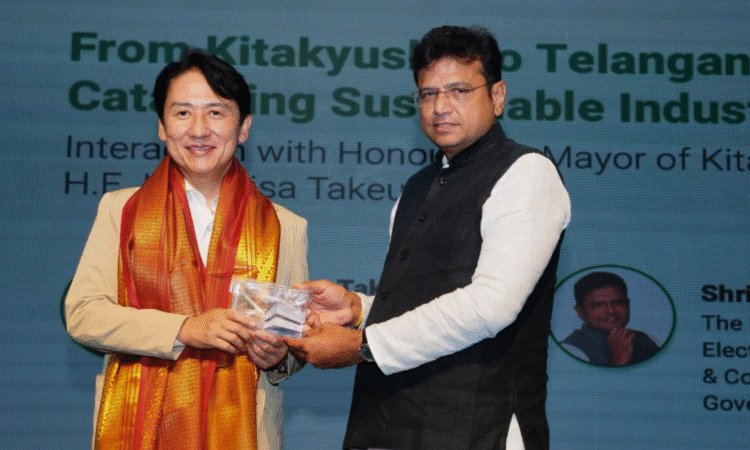Hyderabad: Telangana is laying the groundwork for what it hopes will be a showcase of sustainable industry—an 80-acre “Eco-Town” inspired by Kitakyushu, a Japanese city known for turning itself from a pollution hotspot into a global model for clean manufacturing.
The project, anchored in the state’s broader “Telangana Rising 2047” plan, was announced Monday by IT and Industries Minister D. Sridhar Babu at a conference hosted with the Confederation of Indian Industry (CII). Speaking at Hyderabad’s T-Hub, Babu said the Eco-Town isn’t just another industrial park—it’s intended as a blueprint for integrating green principles into core economic strategy.
“This is a live, working model—not a symbolic gesture,” Babu said, referring to the partnership with Kitakyushu. “It shows that you can build infrastructure, attract industry, and stay environmentally responsible.”
The site will focus on circular economy principles and clean technologies, with the state targeting Net Zero goals and aiming to create a replicable framework for other regions. Officials are betting that the Eco-Town will not only attract new investment but also set Telangana apart as a leader in sustainable industrial development.
Babu pointed to recent investor interest to back up that claim. Telangana, he said, has pulled in ₹3 lakh crore in investments over the past 18 months. Tech giants like Microsoft and Amazon have increased their presence in the state, reinforcing its reputation as a stable business destination.
Ties with Japan are also deepening beyond infrastructure. The state is expanding Japanese language and job-readiness training through its overseas employment agency, TOMCOM, hoping to boost workforce mobility and strengthen bilateral links.
“This is about people as much as it is about policy,” Babu said. “We’re building industrial capacity—and human capacity too.”
The event, titled From Kitakyushu to Telangana: Catalysing Sustainable Industrial Growth, brought together officials, industry leaders, and Japanese delegates. For Telangana, it marked more than a policy rollout—it was a public signal of the state’s ambition to be seen not just as an economic hub, but as a climate-conscious one.










